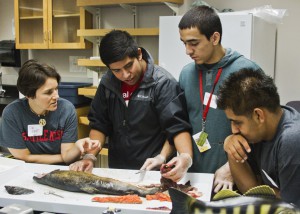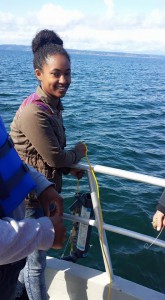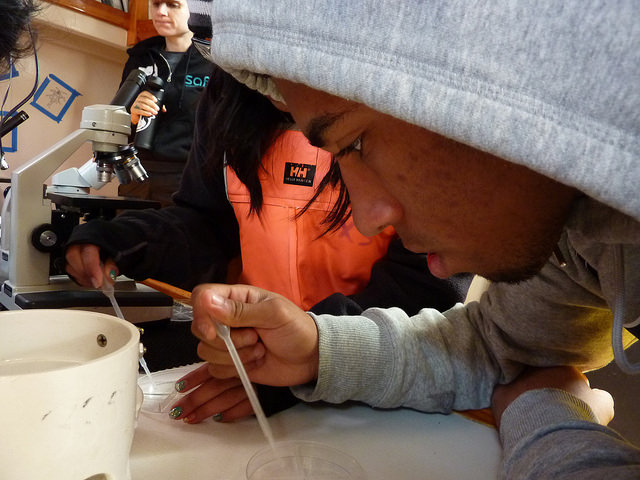Another terrific year with more students, more activities, and more engagement in Marine Biology!
By all accounts, the 2014-2015 Marine Biology Saturday Academy was a huge success! From an increasing number of applicants and students enrolled in the program, to more field trips, and enhanced opportunities to participate in college readiness activities, the program is growing leaps and bounds.
Saturday Academy is a once-monthly, all-day, immersion and enrichment program designed to engage high school students in STEM topics that link directly to daily life, career opportunities, and college majors. Students come from a variety of schools in the Seattle and Mukilteo school districts, and commit to participate in the program throughout the year. Students are selected based on their responses to a few short answer questions regarding their interest in the program, and their academic performance, as well as their past involvement with MESA programs are also taken into account. The students learn from a team of instructors, who are also professors at the University of Washington, and program volunteers. When asked to describe our instructors, students responded, “amazing”, “always explained things so that we could understand”, “so enthusiastic about everything”, “inspiring to learn from”, and “I hope to see you next year”.
While learning more about marine sciences, students had the opportunity to get hands-on with many different activities. While many shy away from dissection, these students relished the chance to see the organs and inner workings of the fish they had been learning about. During the Closing Reception with students and their families, students had the chance to sit in the driver’s seat and show their parents a dissected shark. Dissecting fish and sharks definitely proved to be one of the highlights for the program.
As for whether the students enjoyed the weekend activities, Ynah, a 12th grade student at Ingraham High School, stated, “Most students would not wake up early Saturday mornings, but I did along with other students for Saturday Academy. I decided to join Saturday Academy so that I would have something to do on the weekends. And to my surprise, I had fun and learned a lot…that is what I love about Saturday Academy. I learned that many things are connected and work together just to survive and that it’s our responsibility to take care of it”. Many students responded that they wished the program met more often than once a month.
 Another incredible highlight was the fact that both our Introductory and Advanced sections of Saturday Academy had the chance to explore the Puget Sound aboard two different ships. The Advanced crew set sail with the folks at Salish Sea Expeditions and learned about everything from water chemistry, to plankton in the Sound, to how the crew of the boat uses charts and other navigational aids to find their way. The students even pitched in to help raise and lower the sails! Our Introductory group hit the water with the team from the Ocean Inquiry Project to see first-hand the material they had been learning about on campus.
Another incredible highlight was the fact that both our Introductory and Advanced sections of Saturday Academy had the chance to explore the Puget Sound aboard two different ships. The Advanced crew set sail with the folks at Salish Sea Expeditions and learned about everything from water chemistry, to plankton in the Sound, to how the crew of the boat uses charts and other navigational aids to find their way. The students even pitched in to help raise and lower the sails! Our Introductory group hit the water with the team from the Ocean Inquiry Project to see first-hand the material they had been learning about on campus.
Of this year’s MESA scholarship award winners, 5 of the recipients were participants in the Advanced Saturday Academy. Jainaba, a senior graduating from Mariner High School who will be attending the University of Washington, wrote, “By attending the Saturday Academy, I experienced things that I’ve never done before by learning more about ocean lifespan and what we can do to improve the environment. Gaining all that knowledge and experiences, I now want to major in marine biology when I go to university.”
As demand for the Seattle MESA Saturday Academy program is growing, the list of topics being offered is also expanding. For the 2015-2016 academic year, MESA plans to continue offering the Introductory and Advanced levels of Marine Biology while also offering a Food Sciences academy. The new topic will be open to high school students of all grade levels, and will feature hands-on, real-life examples of everything from where and how our food is grown or produced, to how popular diets meet nutritional needs, to the science behind how you cook or prepare a meal. Plans for a future topic in computer science or information technology are in the works.
If you’re interested in participating, volunteering, or just learning more, please make sure to connect with MESA Coordinator, Leah Quinn (leahq@uw.edu).

